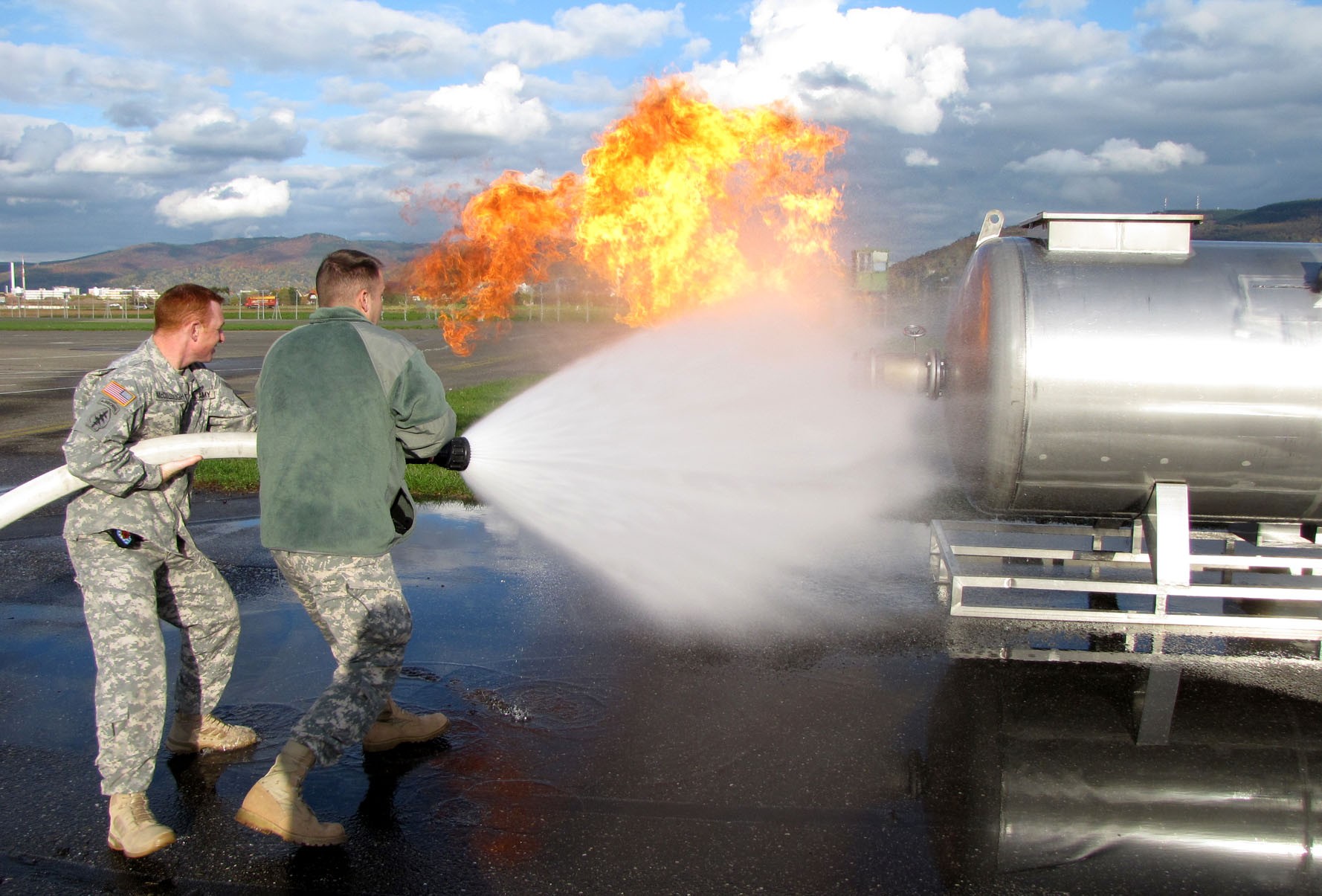HEIDELBERG, Germany - Twenty six Installation Management Command-Europe Directorate of Emergency Services and Provost Marshal senior leaders graduated from a two-week Law Enforcement Senior Leadership Course Nov. 6 marking the successful completion of the first-ever class conducted overseas.
A two-person mobile training team from the U.S. Army Military Police School at Fort Leonard Wood, Missouri, brought the classroom to Europe as part of a two-pronged Installation Management Command initiative to provide more cost effective training and to bolster the capability and knowledge of DES and OPM personnel globally.
"This idea first filtered through DES channels at IMCOM and through training channels at USAMPS to gauge the viability of bringing training to the field primarily in CONUS. However, we had the desire to have the training in Europe. So we conducted a cost analysis that validated measurable cost savings would be realized by bringing two instructors here to conduct training instead of flying 26 students back to the U.S.," said Pete Horcasitas, IMCOM-Europe Directorate of Emergency Services chief. "The end result is that we had outstanding instructors provide valuable training here that strengthens and broadens the knowledge base of our DES and PMO workforce in Europe."
Instructors David Reed, USAMPS Chief of the Law Enforcement Operations Branch, and Candy Vidal, USAMPS LESEL course manager, covered a variety of subject matter spanning the DES and OPM functions to include law enforcement and fire management processes, as well as resourcing, budgeting, and contract management using a seminar-style teaching approach in order to foster discussions and exchange of ideas.
Reed explained that one of the goals was to provide training that facilitated sharing of knowledge.
"This program of instruction is designed to assist provost marshals, DESs, and their senior operational staff to better perform their law enforcement and force protection duties. It's not as simple as a 'how to be a police chief' course," said Reed. "This was designed to provide some solid resources, encourage student discussions, and deliver an overview of the roles and expectations of senior DES and PMO personnel from an Army perspective.
Reed explained that when a course places senior civilian and military members in a venue like this, they tend to learn a great deal from each others experiences as most of them have learned a lot of what they know by doing this job.
"During this course, we discussed policies and standards, but also let students identify areas they wanted to get smarter about, and they did just that," said Reed.
According to Vidal, because many DES and OPM personnel have a tactical background either working in MP platoons, military working dogs, or a narrower mission scope, "this training helped fill the knowledge gap to provide a broader understanding of the responsibilities embedded in the role of a DES or OPM senior leader."
Students from all U.S. Army Garrisons in Europe attended the training bringing with them diverse experience.
Sgt. 1st Class Matthew Drexel, USAG Heidelberg provost sergeant, has been in his current position since April. Prior to that, he was with a K9 unit at Fort Stewart, Ga.
Master Sgt. John Gillespie, USAG Benelux provost sergeant, has a year and half in his current position. Prior to that he was an MP platoon sergeant at Fort Bragg, N.C. Fellow Beneluxer, Capt. Antonio Espinal, USAG Brussels director of emergency services, has been on the job 17 months. He was MP platoon leader at Baumholder before.
Master Sgt. William Trabucco, USAG Wiesbaden provost sergeant, has been in the job about a year. Previously, he was with a line company at Fort Lewis, Wash.
On and on. Attendees talked about tactical experience they had, and how important the class was in helping to define the broader roles of DES OPM specialists at Army garrisons.
Maj. Mike Self, USAG Stuttgart director of emergency services, said the course simply makes sense because, "This is really a baseline course and fundamental to being a deputy or director of DES or OPM. It's important to enable individuals to have basic abilities"
But Self also explained that by fostering dialogue and discussions, "you get exponential learning. The real learning is when you start thinking about some of the challenges shared by other students."
Adeal Frater, USAG Vicenza deputy director of emergency services and provost marshal, said the course covered all the bases.
"It really brought everything all together. I'm up-to-date on new requirements, we looked at Army policy, we looked at how the fire services work, we talked about how to get resources," he said. "We learned a lot of things from each other, the group, that we can take home and use. We got a lot of information, but we also shared problems and shared solutions. This course makes sense. We're more well-rounded and interoperable Europe-specific and the Army-wide."
Department of the Army Civilian Police Capt. James Vaughn, USAG Grafenwoehr DES operations officer, said the value of the course "is immeasurable and is a needed thing."
Vaughn explained that not only did it pass along to civilians and Soldiers the standards and operating principles in place Army-wide, it brought cohesion to the European DES and OPM "community."
"It allowed us to gather as a group, to talk about what's going on... what's going right and what isn't going right, and come up with common solutions as IMCOM-Europe," he said.
Perhaps the most important aspect aside from the sharing of information and ideas, students indicated, was the ability to develop a "network" of fellow DES and OPM specialists.
"There were a lot of great ideas and a lot of knowledge shared," said Drexel. "I feel better equipped now. But, I also know now that I can go to any of the people here and say 'I have a problem ' and I feel confident I will get some good feedback."








Social Sharing